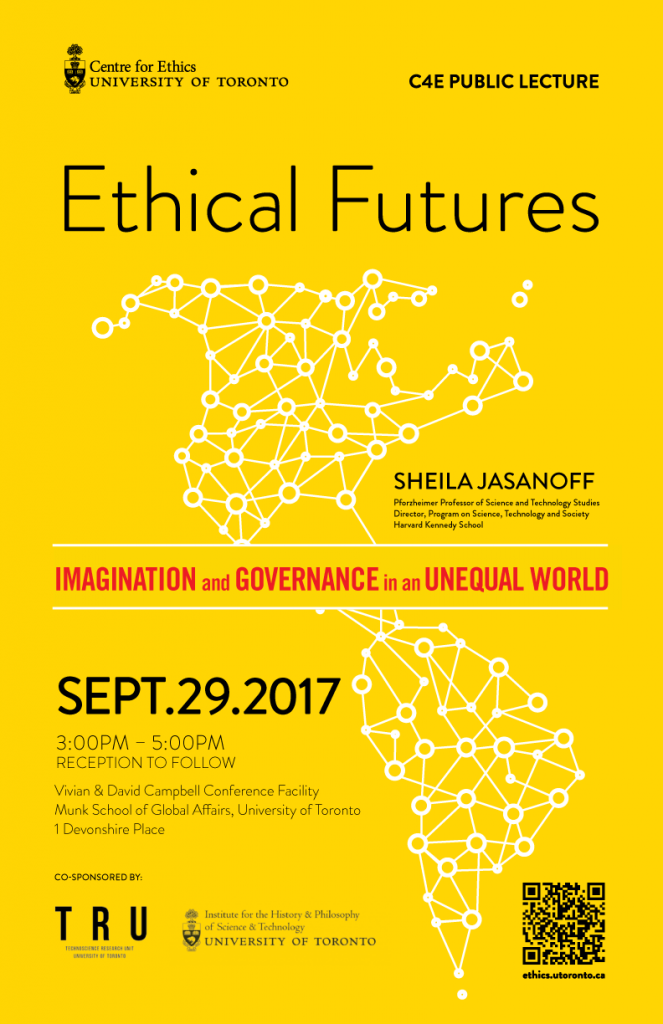- Fri, Sep 29, 2017
Master Class: Sheila Jasanoff, Post-Modern Democracy: Truth and Trust in the Public SpherePost-Modern Democracy: Truth and Trust in the Public Sphere
Even before Donald Trump was elected president of the United States in 2016, political commentators began expressing concerns about the decay of truthfulness in the public sphere. How, they asked, could any form of political legitimacy be maintained in a world where there were no agreed upon facts. Among the responses to this dilemma, one that has found widespread favor among liberals and progressives is that scientific consensus must be respected and held apart from politics. In a democracy, so the truism goes, people are entitled to their own opinions but not to their own facts. This analysis, however, is flawed. It is both ahistorical and asymmetrical in relegating public facts to a position outside of politics and society, a move that denies the contingent, constructed, and culturally situated character of truth in the public sphere. This presentation will propose an alternative view based on findings from Science and Technology Studies. The common misconception that recognizing the contingency of facts is equivalent to radical relativism will be discussed and set aside.
Please note: This Master Class is open to graduate students at the University of Toronto. If you’re interested in attending, please contact ethics@utoronto.ca. Space is limited and registration is required.
Sheila Jasanoff
12:30 PM - 02:00 PM
Pforzheimer Professor of Science and Technology Studies
Director, Program on Science, Technology and Society
Harvard Kennedy School
Centre for Ethics, University of Toronto
Rm 200, Larkin Building - Fri, Sep 29, 2017
Public Lectures
Sheila Jasanoff, Ethical Futures: Imagination and Governance in an Unequal WorldEthical Futures: Imagination and Governance in an Unequal World
A C4E Public Lecture by
Sheila Jasanoff
Pforzheimer Professor of Science and Technology Studies
Director, Program on Science, Technology and Society
Harvard Kennedy School Can we responsibly design a future that does not connect to its pasts? Can we govern a future that we cannot imagine? As technology becomes the most powerful instrument for shaping the human future, these questions have assumed greater importance for moral engagement and analysis. Using examples such as nuclear risk, assisted reproduction, and agricultural biotechnology, I will show that choices of how to live with technology are shaped and constrained by prior, institutionalized visions of the public good. New and emerging technologies, reflecting longstanding socioeconomic disparities among human societies, threaten to override such cross-cultural variations in moral imagination and associated norms of democratic self-governance. How should global societies respond to that challenge? Contemporary debates around gene editing, especially of the human germline, offer an opportunity for further reflection on this point.
Can we responsibly design a future that does not connect to its pasts? Can we govern a future that we cannot imagine? As technology becomes the most powerful instrument for shaping the human future, these questions have assumed greater importance for moral engagement and analysis. Using examples such as nuclear risk, assisted reproduction, and agricultural biotechnology, I will show that choices of how to live with technology are shaped and constrained by prior, institutionalized visions of the public good. New and emerging technologies, reflecting longstanding socioeconomic disparities among human societies, threaten to override such cross-cultural variations in moral imagination and associated norms of democratic self-governance. How should global societies respond to that challenge? Contemporary debates around gene editing, especially of the human germline, offer an opportunity for further reflection on this point.
03:00 PM - 05:00 PM
Vivian and David Campbell Conference Facility
1 Devonshire Place
Centre for Ethics, University of Toronto
Where conversations about ethics happen.


